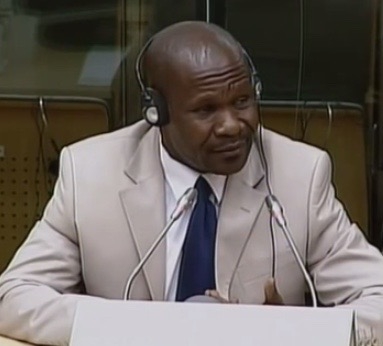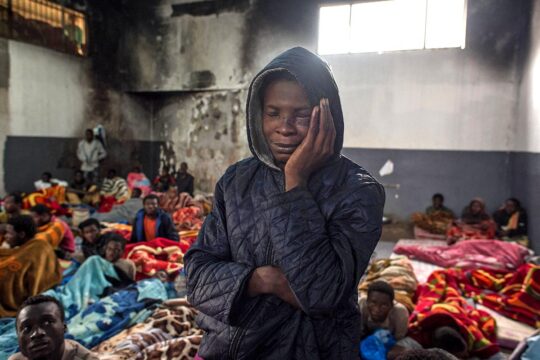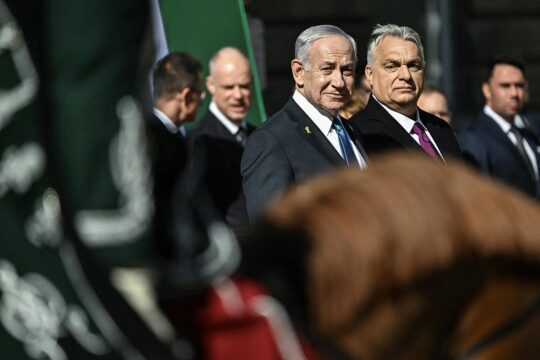The Hague, May 12, 2015 (FH) – Mathieu Ngudjolo, the first person to be acquitted by the International Criminal Court (ICC), was on Monday forcibly sent back to the Democratic Republic of Congo. The ICC and Dutch authorities dismissed fears that his security would be in danger if he went back.
Ngudjolo tried everything to avoid being sent back. But on May 11, handcuffed and escorted by six policemen, he was put on a flight to Kinshasa via Brussels. Belgium rejected his last political asylum request, as did the Netherlands and Kenya. “Mathieu Ngudjolo is viewed as a war criminal,” says his Swiss lawyer Saskia Ditisheim. “He has been treated from start to finish like a convict.”
Ngudjolo is a former militiaman who joined the Congolese army as a colonel after the 2006 peace agreement. He was arrested and transferred to the ICC in February 2008. The Court charged him with crimes against humanity and war crimes in connection with the February 2003 massacre in Bogoro, a village in the eastern DRC, where Rwanda and Uganda have fought for mineral wealth through local militias. During his trial, Ngudjolo claimed that the Congolese government of President Joseph Kabila planned the attack in order to take back territory that was then in Ugandan hands. “I am a soldier and that’s my fear,” he told JusticeInfo in the Amsterdam airport detention centre a few days before his expulsion. “The Congolese authorities know I have filed asylum requests. When I get to Congo, I will be arrested for desertion, and not only that! During my trial I filed documents that are classed defence secrets.” This could even carry a death penalty, according to Aprodhec, an association of Congolese diaspora in Belgium. In a May 7 statement, Aprodhec said that if Ngudjolo disappeared, it would “take legal action against any individual or entity suspected of complicity in murder”.
But Ngudjolo’s fears for his security did not move either the Dutch authorities or the ICC. Having acquitted him, the ICC says it is no longer responsible for him, although it cooperated with the Dutch authorities in getting him deported. ICC rules say the transfer of an acquitted person out of the Netherlands should take account of that person’s views, but the ICC preferred to base its action on guarantees from Kinshasa contained in a confidential report. These guarantees are offered by the same government from whom Ngudjolo says he fears reprisals.
ICC spokesperson Fadi El Abdallah said Ngudjolo would be safe in the DRC and that he did not run any risks as a result of his ICC trial. The Dutch authorities based their refusal of Ngudjolo’s asylum request on the same report. They do not want the ICC to become an open door to the Netherlands. In addition, like the ICC, the Netherlands does not want to tarnish its relations with Kinshasa.
Ngudjolo’s lawyers say they do not understand. “In a couple of months he’ll disappear and be killed, and the ICC’s witness protection department will have no power,” lawyer Flip Schüller says bitterly. “The Congolese authorities will order an investigation whose results we’ll probably never get.”
Human Rights Watch called on the ICC and the Dutch authorities to “closely monitor Ngudjolo’s situation for as long as necessary” to make sure he is safe.
Lawyer Jean-Pierre Kilenda wrote in April to Sidiki Kaba, President of the ICC Assembly of States Parties, calling for “a sensible solution” to avoid Ngudjolo being “sacrificed on the altar of considerations outside the law”. But twenty years after its rebirth in the 1990s, international justice has still not found a solution to the problem of acquitted persons. At the International Criminal Tribunal for Rwanda (ICTR) in Arusha, eight acquitted people and three who have served their sentences live in a safe house paid for by the UN, and are still waiting for host countries, despite negotiations with several countries where their families are living. Unlike the Dutch authorities, Tanzania has not sent them back to Rwanda and tolerates their presence on its territory.






